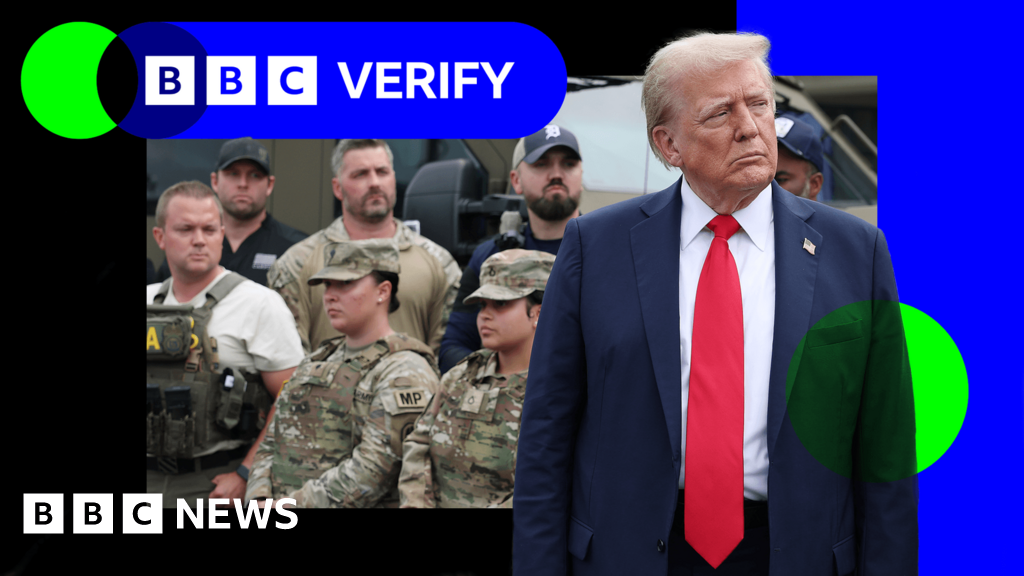Alongside the taxis waiting outside Union Station in Washington DC, the sight of uniformed troops standing next to armored military vehicles has been greeting passengers getting off their trains.
It is a striking symbol of President Trump's efforts to tackle a crime emergency in the US capital, which has seen his administration take over its police department and send National Guard troops, FBI, and ICE agents onto the streets. Trump says his crime crackdown, which began on August 11, has had an immediate effect: The numbers are down like we wouldn't believe, but we believe it.
He has claimed that it has led to an extended period of time without any murders, a trend he says has not been seen in the city for decades.
So what do the crime figures show? There has been a significant fall in overall violent crime since the crackdown started, according to Washington's Metropolitan Police Department (MPD). It recorded 75 violent crimes from August 12-26, a drop of 23% on the previous two weeks. Property crimes, such as burglary and vehicle theft, fell by about a quarter over the same period. There was a smaller fall in the crime of assault with a dangerous weapon and an increase in recorded sex abuse.
However, US crime analyst Jeff Asher notes that reporting of crime always lags, so some of that decline is likely artificial. You probably need six weeks or so for incident-based reporting to catch up and make a comparison of the most recent period, Asher explains.
Moreover, US Attorney General Pam Bondi has reported over 1,000 arrests since the crackdown began, with claims that nearly half were illegal criminals who never should have been in this country to begin with. Despite the increase in arrests, criminologists warn that citing arrest figures as successful measures against crime may not reflect the actual effectiveness of law enforcement.
In the court system, Judge Zia M. Faruqui expressed concerns that the DC criminal justice system is struggling to cope with the increased caseload brought on by this crackdown. He emphasized the need for a surge in the protection of human dignity as prosecutions rise.
Ultimately, while data shows immediate drops in crime since Trump's actions, the longer-term effects remain to be seen, as analysts warn of potential reporting issues and the strain on the judicial system.
It is a striking symbol of President Trump's efforts to tackle a crime emergency in the US capital, which has seen his administration take over its police department and send National Guard troops, FBI, and ICE agents onto the streets. Trump says his crime crackdown, which began on August 11, has had an immediate effect: The numbers are down like we wouldn't believe, but we believe it.
He has claimed that it has led to an extended period of time without any murders, a trend he says has not been seen in the city for decades.
So what do the crime figures show? There has been a significant fall in overall violent crime since the crackdown started, according to Washington's Metropolitan Police Department (MPD). It recorded 75 violent crimes from August 12-26, a drop of 23% on the previous two weeks. Property crimes, such as burglary and vehicle theft, fell by about a quarter over the same period. There was a smaller fall in the crime of assault with a dangerous weapon and an increase in recorded sex abuse.
However, US crime analyst Jeff Asher notes that reporting of crime always lags, so some of that decline is likely artificial. You probably need six weeks or so for incident-based reporting to catch up and make a comparison of the most recent period, Asher explains.
Moreover, US Attorney General Pam Bondi has reported over 1,000 arrests since the crackdown began, with claims that nearly half were illegal criminals who never should have been in this country to begin with. Despite the increase in arrests, criminologists warn that citing arrest figures as successful measures against crime may not reflect the actual effectiveness of law enforcement.
In the court system, Judge Zia M. Faruqui expressed concerns that the DC criminal justice system is struggling to cope with the increased caseload brought on by this crackdown. He emphasized the need for a surge in the protection of human dignity as prosecutions rise.
Ultimately, while data shows immediate drops in crime since Trump's actions, the longer-term effects remain to be seen, as analysts warn of potential reporting issues and the strain on the judicial system.





















